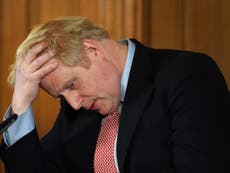Has Boris Johnson got it right on coronavirus? I don’t know, and nor does anyone else
The prime minister has confounded expectations, and taken a big risk, by putting faith in his experts

The first two questions from journalists at the prime minister’s news conference on Thursday were “How sure are you that the approach is right?” and “How many will die?”
They are the right questions to ask, but the answers, in both cases, were, in effect: “We don’t know.” Unfortunately, it is this uncertainty that people find hard to deal with, and which feeds the worst aspect of the social media response to the coronavirus crisis.
On social media, people seem to pay most attention to other people who seem most sure of themselves. The much derided “mainstream” media, including The Independent, try on the other hand to report what the most authoritative people are saying, which includes saying how much they do not know.
I thought Boris Johnson handled the news conference well. He seemed sombre, well informed, and properly deferential to the advice from the chief scientific adviser and the chief medical officer (CMO), who were both impressive.
They were at their most impressive in explaining the limits of their knowledge – Chris Whitty, the CMO, in particular, in setting out precisely why he wasn’t going to answer the death toll question.
Perhaps I spend too much time on liberal Twitter, but it seems full of people who know better than the prime minister’s top science people. It is as if some people have decided that Johnson is a Leaver, a Conservative and a buffoon and therefore must be wrong. He may be all those things but he seems to be doing exactly what Twitter would hope a Labour Remainer sage would do – namely listen to the best advice and act on it.
The polarisation of politics means that some strange views are expressed on social media. People who once tastelessly suggested that the Remain cause would prevail in the end because elderly Leavers would die are now accusing the prime minister of wanting to cull old people.
Others who mocked Michael Gove for saying “the people of this country have had enough of experts” are now claiming that the experts have got it wrong and that the government should shut down the country.
These could be the side-effects of our inability to cope with uncertainty. Some people react to uncertainty by inventing certainties of their own; but the rest of us have to learn to live with the not knowing.
That means, I think, taking the advice of experts. At which point I digress, to point out that Gove did not say what everyone thinks he said. What he actually said, during an interview in the 2016 referendum campaign, was: “The people of this country have had enough of experts ... from organisations with acronyms saying that they know what is best and getting it consistently wrong.”
He was talking about organisations that had urged Britain to adopt the euro, and who now said it would be economically damaging to leave the EU. As it happens, I think they were wrong about the euro and right about Brexit.
But that is the problem with experts: they can sometimes be wrong. Which is why different experts have different opinions. There appears to be a sharp difference today between the experts advising the World Health Organisation and those advising the UK government about the importance of testing.
I have no idea who is right, and neither does anyone else. You would have thought that no one could even have a useful opinion one way or the other, unless they were a specialist in a relevant field. But I would expect anyone who was prime minister to listen first to the government’s experts.
That doesn’t mean uncritically accepting what they say. One of the most important tests of an effective minister is whether they have the confidence and judgement to challenge expert advice – and to recognise the dangers of groupthink or outdated assumptions. But I do not see how anybody can be sure that Whitty, and Patrick Vallance, the chief scientific adviser, have got it wrong.
In the meantime I am grateful for two things.
One is that, whatever the similarities between support for Brexit and support for Donald Trump, and whatever you think of Boris Johnson, he is very different from the US president. The other is that the worst effect of popular irrationalism so far would seem to be people panic-buying loo rolls.





Join our commenting forum
Join thought-provoking conversations, follow other Independent readers and see their replies